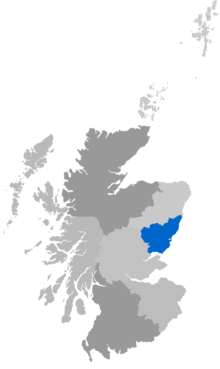Our website is made possible by displaying online advertisements to our visitors.
Please consider supporting us by disabling your ad blocker.
Diocese of Brechin (Episcopal)
Diocese of Brechin Dioecesis Brechinensis | |
|---|---|
 Coat of arms | |
 Flag | |
| Location | |
| Country | Scotland |
| Ecclesiastical province | Scotland |
| Statistics | |
| Congregations | 29 |
| Information | |
| Denomination | Scottish Episcopal Church |
| Established | 1153 |
| Cathedral | St Paul's Cathedral, Dundee |
| Current leadership | |
| Bishop | Andrew Swift |
| Map | |
 Map showing Brechin Diocese within Scotland | |
| Website | |
| thedioceseofbrechin.org | |
The Diocese of Brechin is in the east of Scotland, and is the smallest of the seven dioceses of the Scottish Episcopal Church. It covers the historic counties of Angus and Kincardineshire. It stretches from Muchalls in the north east down to Dundee in the south, and across to Glencarse in the south west. The cathedral and administrative centre is St Paul’s Cathedral in Dundee. The diocese continues to be named after its medieval centre of Brechin.
The diocese is thought to have been founded in 1153 by Bishop Samson. The diocese had a continuous line of bishops leading through the Reformation, when Donald Campbell (1557) and John Sinclair (1565) were elected Bishops of Brechin, but not consecrated; the line was continued later through Andrew Lamb. In 1566, Alexander Campbell was appointed as titular bishop. The line continued in proper form among Episcopalians with Andrew Lamb in 1610. From 1695 until 1709, the diocese was united with the Diocese of Edinburgh, with the latter's bishop, Alexander Rose, being also Bishop of Brechin. The line of independent bishops of Brechin restarted with John Falconar in 1709, and has continued to the present day. Following the resignation and death of the Right Reverend Dr John Mantle, in 2010, Dr Nigel Peyton was appointed Bishop of Brechin in May 2011. Dr Peyton was chosen ahead of four other candidates including Dr Alison Peden.[1]
The Diocese of Brechin is twinned with the Episcopal Diocese of Iowa (Iowa, United States) and with the Anglican Diocese of Swaziland (Swaziland).
The manuscript records of the Diocese of Brechin are held by University of Dundee Archive Services.[2] The archive collections include the administrative records of the diocese, records of individual churches, and the correspondence of Alexander Penrose Forbes and George Frederick Boyle.[3]
- ^ Bowman, Maura (19 May 2011). "Dr Nigel Peyton appointed Bishop of Brechin". The Courier. Archived from the original on 21 May 2011. Retrieved 7 October 2011.
- ^ "University of Dundee Archive Services Online Catalogue". University of Dundee. Archived from the original on 1 May 2015. Retrieved 18 February 2015.
- ^ "Archive Services Online Catalogue Collection Summaries". University of Dundee. Archived from the original on 18 February 2015. Retrieved 18 February 2015.
Previous Page Next Page


